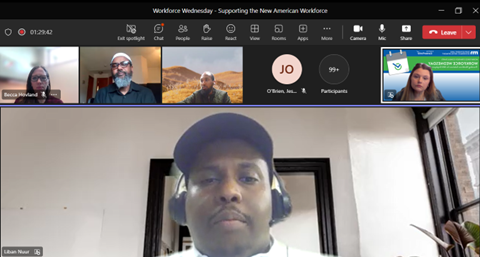3/13/2024 8:06:33 AM

Minnesota welcomed nearly 35,000 new arrivals from other countries between 2020 and 2023, the latest year for which census data is available. These new arrivals include immigrants, refugees, additional people from other countries here under humanitarian protection and others. Work authorization varies by group. While the definition is very broad, these new arrivals in Minnesota are often called collectively New Americans.
The March Workforce Wednesday session hosted by DEED Workforce Strategy Consultant Shayla Drake focused on welcoming New Americans to Minnesota and connecting this often under-employed labor pool with good jobs. The session started with an overview of services provided to New Americans in Minnesota. Then panelists from a range of organizations that serve New Americans provided a wealth of examples of how their organizations and others doing similar work can help connect New Americans and Minnesota employers.
One segment of the discussion was an examination of English language skills as one of the most common barriers to employment for New Americans.
"Mostly these newcomers are bilingual or trilingual, but English is a barrier that most of them have," said Ahmed (Jaffer) Mohamud, Minnesota Council of Churches, Refugee Services - Mankato Team Co-Coordinator. "We help them with applications and help them with resumes and workforce training about what does a job look like in the U.S."
"Not being able to communicate in English is one of the barriers…it is more of an initial barrier, not a latter barrier when we refer them to [English language classes]," said Liban Nuur, Lutheran Social Service of Minnesota, Metro Program Manager. "We see that people have talent and skill to do everything that the employer is asking but having that language barrier … we all know that without being able to complete an application you don't even get an interview to share the skills you have."
"Filling out an application is always difficult when someone doesn't understand the language," said Mohamed Haashi, Lutheran Social Service of Minnesota, Central Minnesota Program Manager. "Simple applications might help our clients."
"One of the biggest things we see is employers who require a specific level of English like fifth grade English or eighth grade English, what does that look like that? And what is actually needed to complete the job?" said Becca Hovland, CAPI USA, Director of Refugee Services.
Panelists were asked how they help New American clients overcome English language and cultural barriers to match their skills to employment opportunities.
Hovland provided an example of one way to help clients demonstrate skills: "We've taken various clients to a local mechanic shop where they asked our client 'just show me what you can do' and then they were able to write a confirmation that 'yes this person does have the skills' so that we could take that to other employers when they were applying for jobs."
"We do skills assessment where we do intake, we individualize and get to know our clients…and find out what could be transferable skills. Someone may say 'I never worked' but there may be cultural [perspective] where a woman does more work than a man, but it's not considered work, like running a house with ten kids. I can only imagine the skills and time and management," said Nuur of the often-unrecognized skills a homemaker can bring to an employer.
Panelists also discussed ways their organizations can help employers create a good hiring experience.
Mohamud provided an example of an employment candidate who didn't understand the dress code at a prospective employer and was turned away when he arrived for his interview. Mohamud worked with him to prepare for an interview at another employer: "One minor mistake, which we can immediately explain to that applicant, he missed the opportunity with [the first] employer, luckily we filled out an application with another employer and he got that position…and within three months he became the line leader there."
Hovland recommended "having all levels of [current] employees on board with cultural sensitivity. While HR might understand trauma and differences in cultural behaviors like eye contact or handshakes that might really look good in an interview from an American perspective but might not be acceptable from a different culture, so knowing that everyone within the employer [organization] is on board with cultural sensitivity [helps]."
Ensuring that New Americans have support with other aspects of life in a new country also helps prepare them to find and keep work. Haashi described the full range of services provided to help new arrivals be successful.
"We work with refugees from many parts of world. We work closely with refugees to secure housing, find employment, enroll in school and connect to medical care," said Haashi. "Our employment services provide job readiness training, assistance to secure and maintain employment, post-employment support and access to individual employment assistance."
You can view a recording of the March Workforce Wednesday discussion, access panelists' contact info and find a full slate of related resources in the Workforce Wednesday section of CareerForceMN.com.
immigrants and refugees
Workforce Wednesday